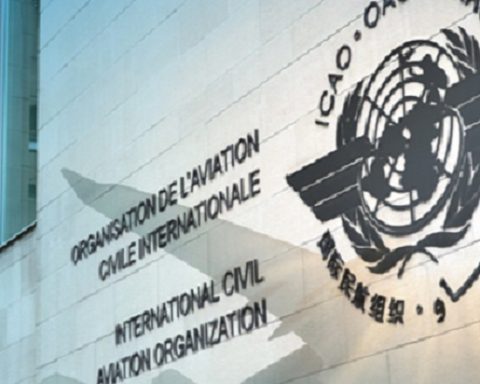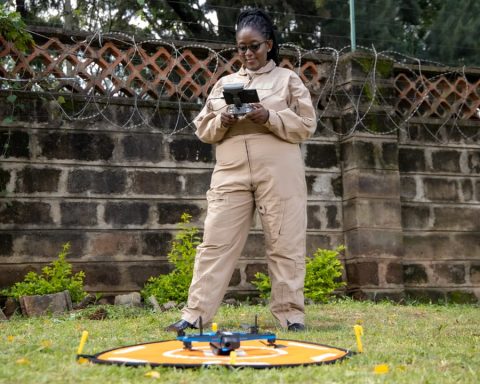BY: Roy Eze
Like almost everywhere else in the world, Africa is having to come to grips with the challenges of integrating drone operations with manned aviation
The challenge is to ensure the safe co-existence of Unmanned Aerial Vehicles (UAVs) generally referred to as drones. Individual African states are taking steps to develop temporary frameworks to regulate the operation of drones in their airspace.
AWAITING REGULATION
At a drones conference in Rwanda in early 2020, Mr. Tefera Mekonen, Secretary General of the African Civil Aviation Commission (AFCAC), proposed to conduct awareness and capacity building around drone operations to clearly distinguish between civil and military uses. He also pledged to work with ICAO and partners to develop a continental framework to harmonise policies across countries and regions, as well as enhance national collaborations, partnerships, networks and knowledge exchange to facilitate upscaling and the use of drone technology.
In a further drone meeting in Lagos, Nigeria, stakeholders sought to fast- track drone regulation procedures, and thus hopefully to open a floodgate for the benefits of drones to operators and the broader economy.
Though the volume of air traffic in Africa is remarkably low compared to most other regions, with Africa having less than 3% of global air passenger traffic and less than 2% of global air cargo traffic, the trend of unmanned aircraft in parts of Africa might suggest drone operations could grow much faster than manned aircraft traffic in Africa.
STATES ARE OPTIMISTIC
Several African states have come up with stop-gap strategies to regulate the operation of drones in their airspaces. Beyond reaping the benefits expected from the operation of drones, African States are compelled to regulate drones in order to ensure safety and security of drones coexisting with manned aircraft. Other issues of respect for privacy are also of concern.
Ghana, for instance, has laid out comprehensive guidelines for the regulation of drones in its airspace, including charges and fees for various categories of drones. The Ghana regulator (GCAA) has aligned itself with widely accepted standards by specifying that drones may not be operated above 400 ft agl and out of visual line of sight. GCAA also has guidelines for the regulation of drone pilots and pilot instructor licensing, as well as the change of ownership of RPAS, and regulation of RPAS associations and clubs in Ghana.
In Sierra Leone, the challenge of regulation of drones is still receiving attention from the Sierra Leone Civil Aviation Authority, which is collaborating with other partners like the Directorate of Science, Technology, and Innovation (DSTI) and others. The Sierra Leone government partnered with UNICEF, late in 2019, to launch a drone corridor to facilitate medical supplies. The government is also working on a drone ecosystem to enhance the development of research and skills development locally.
In Bamako, Mali, drones are in use for mapping as part of efforts in environmental protection. In Malawi, Ghana and Rwanda, drones are used to overcome the challenges of distance and poor land transport infrastructure, while delivering medical supplies. Dr Moinina David Sengeh, Chief Innovation Officer of UNICEF, said “drone blood deliveries in Ghana and Rwanda are saving lives.”
Nigeria’s Minister of Aviation, Senator Hadi Sirika, said drones pose a risk and should be regulated without compromising the benefits for leisure and other economic activities. Nigeria, as Africa’s most populous and largest economy, projects government revenue of $2.1billion revenue from drone regulation.
Currently, drones are in high demand in Nigeria for the monitoring of coastlines, oil installations, mapping and leisure activities. Local governments have recently issued requests for proposals for drone monitoring of government installations. Proposed
Nigerian regulation for drones was expected to take effect from January 2020, and aims at “full and total integration of unmanned aerial systems (UAS)” with civil aviation in Nigeria.
Capt. Dele Sasegbon, of the Nigerian Civil Aviation Authority (NCAA), said drone operators must display their registration on their UAVs, while operators must report any safety issues to the NCAA. “If you have to fly in the airspace you have to be identifiable and follow the rules and regulations,” he said.
There is a strong quasi-military involvement. Air Vice Marshal Olufemi Idowu (Rtd.), President of the Nigeria Unmanned Systems & Robotics Association (NUSA) and CEO of Noble Logistics, called for continued discussion among drone users, manufacturers, regulators, and other stakeholders to ensure the best outcome for the drone industry in Nigeria. Col.
Ayokunle Owolabi from Nigeria’s Office of the National Security Adviser (NSA) stated that NSA is engaged in a sensitisation and awareness campaign, a regular review of RPAS advisory circulars as well as enforcement of regulations to ensure improved security in the use of drones, while working closely with NAMA, Nigerian Air Force (NAF), and the NCAA. Kenya is expected to lift its ban on drone operations in 2020, with the introduction of its Unmanned Aircraft Systems Regulations 2019.
CAUTION DECELERATES DRONE ACTIVITIES
Overall, slowly evolving national regulations has slowed the penetration of drones activities and attendant benefits in Africa, and more applications for registration continue to stack up in various States. In Nigeria, for instance, over 500 requests from potential operators are being processed. Currently, about 10,000 drones operate in Lagos alone, according to a source from the local Civil Aviation Authority.
Extreme caution over security challenges especially in those countries facing security issues, like Kenya and Nigeria, is a major factor slowing down the implementation of the regulation already developed by their CAAs. In Nigeria, for instance, the NSA is said to be taking stringent precautions in screening drone operators; while the Kenyan parliament instigated the banning of the use of drones in March 2019, citing the possibility of security risks.
Given these security concerns, overall, large drones for cargo particularly may face more rigorous approvals. Perhaps, a more universal regulatory framework from ICAO could bring more confidence concerning drones regarding national security. “ICAO has already begun updating its standards, and it has also hosted a series of ‘Drone Enable’ events bringing together innovators from the private sector and regulators from the public sector to help realise effective global solutions to these challenges, said Dr. Fang Liu, Secretary-General of ICAO.
Worldwide, regulators in Africa are seeking to strike a balance between fostering innovation without undue delays and red tape, while at the same time ensuring a safe, effective, equal opportunity and socially sustainable regulator said ICAO’s Dr. Fang Liu.



